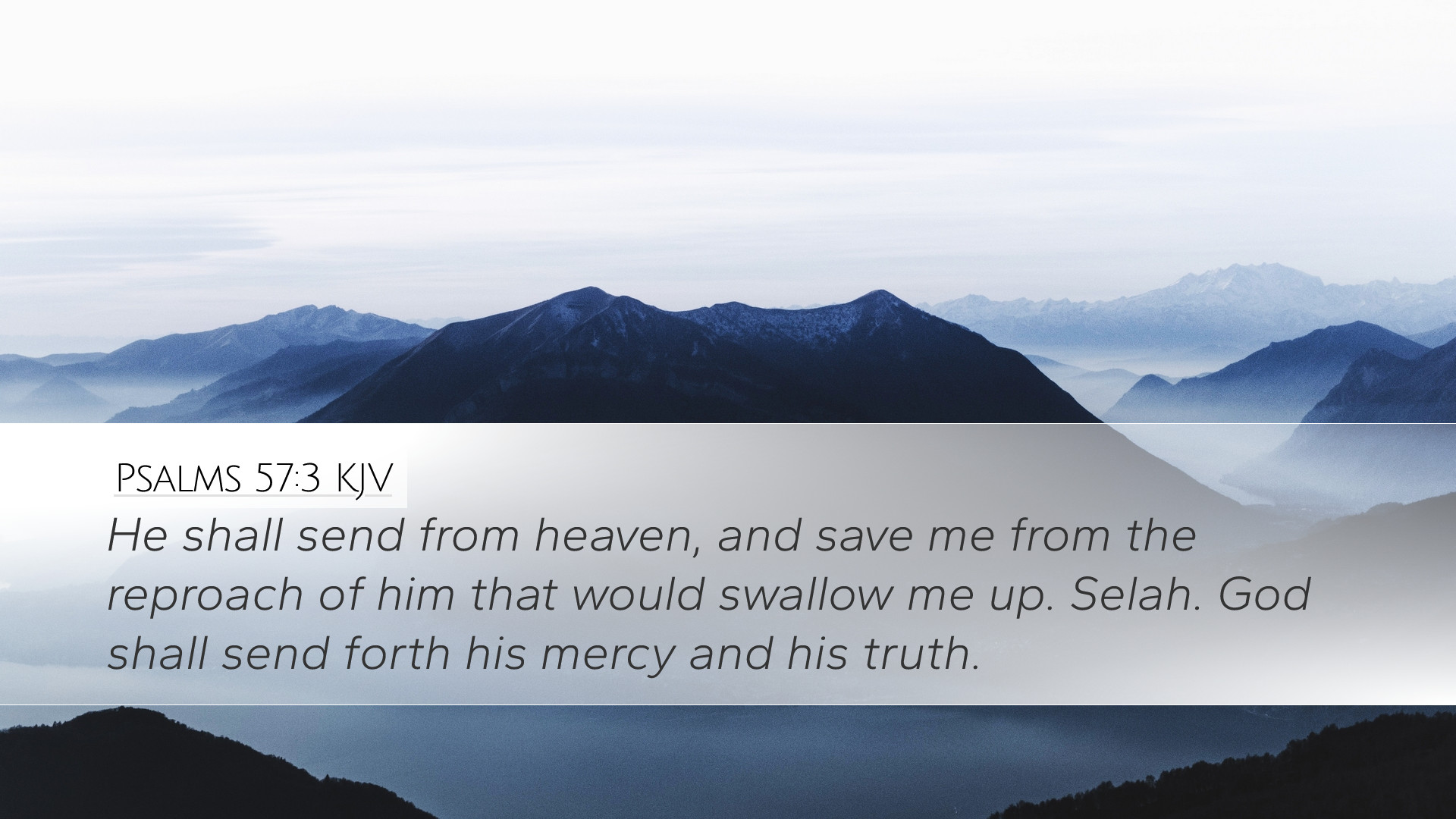Commentary on Psalms 57:3
Psalms 57:3: "He shall send from heaven, and save me from the reproach of him that would swallow me up. Selah. God shall send forth his mercy and his truth."
Context and Background
The Psalms are a collection of spiritual songs, prayers, and meditations found in the Old Testament, attributed primarily to Israel's greatest king, David. Psalm 57 is one of the מִמְטָ֥ע ('Miktam') psalms, traditionally ascribed to times of great distress. In this case, it is believed to have been written when David fled from Saul, taking refuge in a cave.
Interpretation and Analysis
In this verse, David expresses his confidence in God's deliverance in the face of overwhelming opposition and oppression. The phrasing reflects a dual aspect of divine intervention through mercy and truth, which will be looked at through the lens of various biblical commentaries.
Matthew Henry's Commentary
Matthew Henry emphasizes the comfort that arises from God's promise of salvation. He notes that although David faces severe reproach and danger, he trusts that God will act on his behalf. Henry details David's understanding of God's mercy, which he sees as an essential trait of God's character in times of trouble:
- Divine Intervention: Henry points out that God’s sending forth from heaven signifies His omnipresence and readiness to intervene in human affairs.
- Reproach of the Enemy: The term "reproach" is indicative of the shame and disdain that David faced from Saul, symbolizing broader spiritual struggles against adversaries.
- Assurance in God's Mercy: Henry highlights that David's faith rests not merely on God's ability to save but on His attributes—God’s mercy and truth are pillars upon which David relies.
Albert Barnes' Commentary
Barnes reflects on this verse by expounding on the meanings of mercy and truth. He points out that:
- Mercy: This conveys God’s love and kindness toward His people, indicating that His favor is not earned by our merit but given freely.
- Truth: Barnes interprets truth as the assurance of God’s promises, emphasizing faithfulness as a divine trait amidst David’s trials.
- Context of Selah: The mention of "Selah" serves as a reflective pause, allowing readers to contemplate the depth of these truths—encouraging a meditative response to divine faithfulness.
Adam Clarke's Commentary
Clarke's insights delve deeply into the poetic structure and spiritual significance of the verse:
- Heavenly Assistance: Clarke explicates the phrase "send from heaven" as suggesting not just physical rescue, but spiritual and emotional deliverance, encapsulating a holistic view of salvation.
- Swallow Me Up: This expression illustrates the all-encompassing nature of David’s foes, representing existential threats to anyone striving for righteousness.
- Mercy and Truth: Clarke correlates both attributes of God with covenant faithfulness, underscoring that God's inherent nature is one of compassionate loyalty to His children.
Theological Reflections
Summarizing insights from the three commentaries, we observe several key theological considerations surrounding Psalm 57:3:
- The Nature of God: The attributes of mercy and truth reveal God's character as loving and steadfast, underpinning the believer's hope.
- Human Struggle: David’s plight mirrors the challenge faced by all believers in a fallen world characterized by opposition and trial.
- Hope and Assurance: The psalm encourages reliance upon divine assistance—inviting readers to acknowledge divine sovereignty, particularly in times of despair.
- Call to Reflection: The use of "Selah" prompts spiritual contemplation, suggesting that understanding God's attributes should lead to worship and trust.
Conclusion
In Psalm 57:3, we find a profound expression of faith amidst adversity. The combined insights from Matthew Henry, Albert Barnes, and Adam Clarke provide a rich commentary that underscores God's unchanging nature of mercy and truth. For pastors, students, theologians, and scholars, this psalm serves as a powerful reminder of God's faithfulness and the importance of placing our trust in Him in the face of life's challenges.


